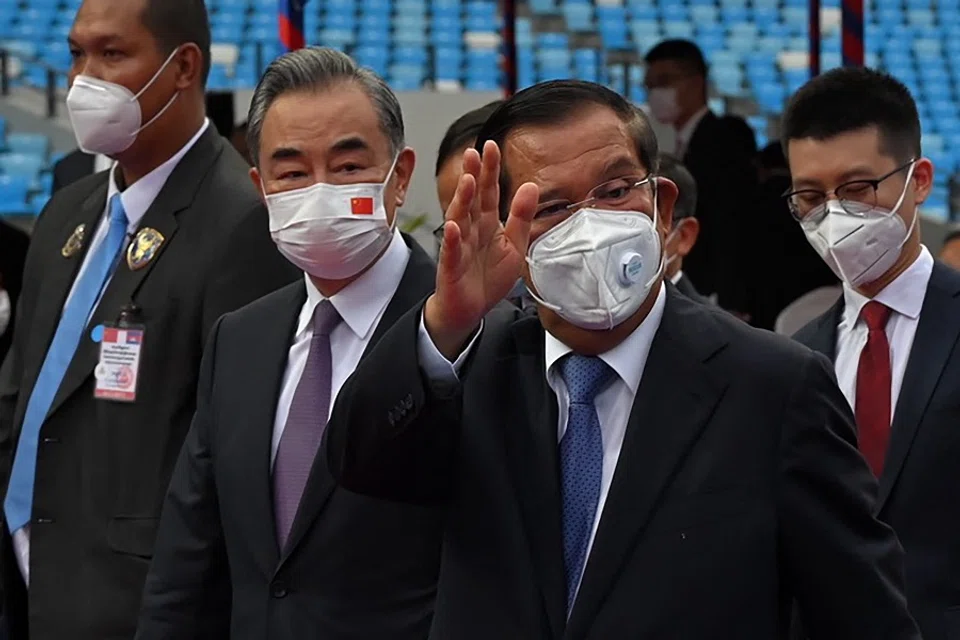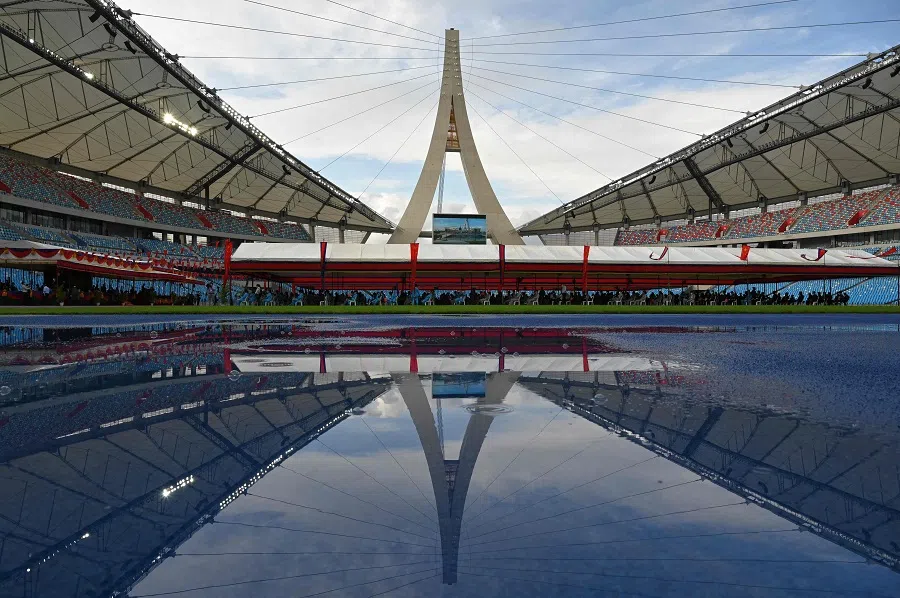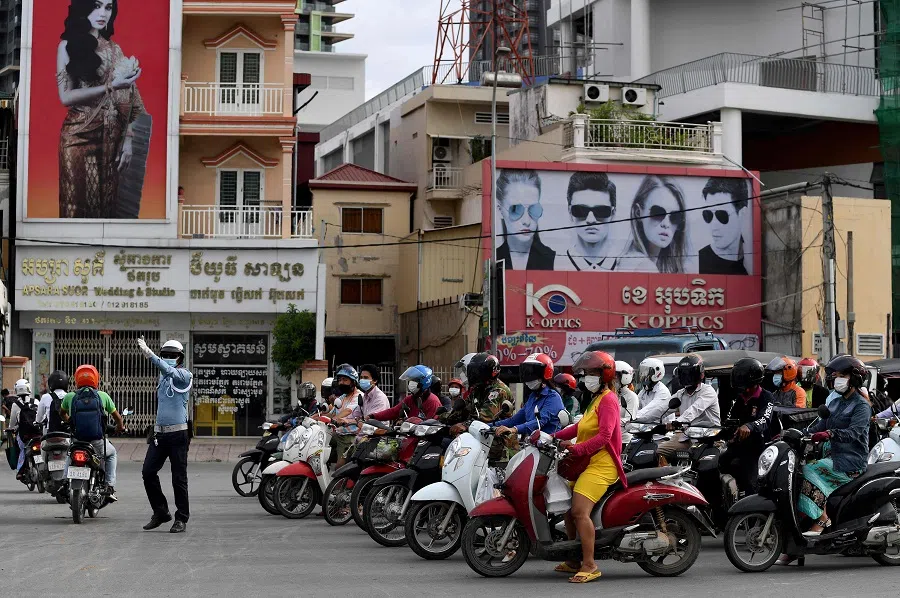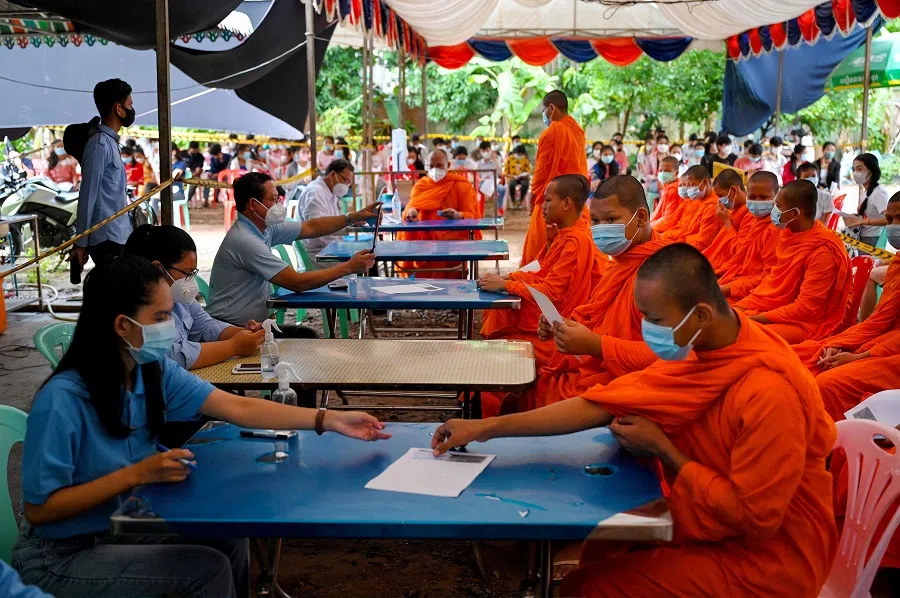How China became Cambodia's important ally and largest donor
While Cambodia is aware that its close relations with China may leave it vulnerable in many ways, it seems to think that this is still the better bet in light of shaky relations with the US and a historical distrust of Vietnam.

Historically, Cambodia has been sandwiched between the Vietnamese and Siamese (Thai) when the two countries struggled to divide Cambodia along the Mekong Delta. Fortunately, with the arrival of the French protectorate in 1863, Cambodia was spared from being devoured by these two countries. Without the French arrival, Cambodia would have been grabbed by the collar by two powerful neighbours who had a relatively strong military and large population.
At present, international law, organisations, conventions and agreements have been created to safeguard the state's sovereignty and territorial integrity; however, the security of small states like Cambodia remains threatened by foreign aggressors. Vietnam's intervention on the genocidal Khmer Rouge regime in 1978 and skirmish along the Cambodia-Thai border during the border conflict in 2008-2011 are indications that Cambodia remains vulnerable to foreign military aggression. It is also a reminder that only with military and economic strength can Cambodia maintain its survival and security.
Neither the United Nations Security Council (UNSC) nor ASEAN can do anything other than rhetorically condemn the armed aggressor and ask the involved parties to seek a peaceful settlement. The Cambodia-Thai border dispute that led to military clashes in 2008-2011 is an example of that. ASEAN and the UNSC failed to provide an immediate effective solution to border disputes and prevent arm conflict along the border. In this sense, opting for regional balancing through building a bandwagoning strategy for external superpowers' support would appear to be a viable solution for small states like Cambodia.
Historical animosity towards Vietnam
Currently, the world is dominated by various great powers in what is dubbed a multipolar world. There are only two great powers that are capable of providing security guarantees to Cambodia which are the US and China because they have a great projection of power and extensive economic prowess.
However, Cambodia-US relations remain fragile, not to mention the US is a far-flung superpower whose influence in Asia has been declining. Cambodia's neighbouring countries have also seemed to be more strategically important for the US in countering the rise of China, particularly in the South China Sea. This has diminished the US's commitment to as well as support for Cambodia. The visit by the US Deputy Secretary of State Wendy Sherman on 1 June proves this trend of thought.

The question of China's military presence in Cambodia re-emerged when US Deputy Secretary of State Wendy Sherman made a request for the US to access Ream Naval Base. Prime Minister Hun Sen granted the request but the visit to Ream Naval Base by the US defence attache only led to the further deterioration of relations between the two countries. The US accused Cambodia of denying it full access to Ream Naval Base, while the Cambodia side viewed the US's statement as provocative and untrue. Following that, the US ended its aid assistance to Cambodia's Green Prey Lang Project and also ended military scholarships to Cambodian students to study in the US.
The rise of Vietnam poses a problem to China. It also threatens Cambodia's security as Vietnam has been viewed as Cambodia's traditional enemy who has the intention to absorb Cambodia into its own territory.
Amid deteriorating Cambodia-US relations, the US has shown its commitment to Cambodia's powerful neighbour, Vietnam, which is Cambodia's historical enemy. The visit to Vietnam by US Vice President Kamala Harris is an example of that. Through the visit, the US has shown its willingness to elevate the US-Vietnam relationship to a comprehensive strategic partnership. The fast upgrading of relations in the past twenty years from bitter enemy to strategic partnership is an indication that the US will play an important role in helping Vietnam to strengthen its economy and military power in the region.
The rise of Vietnam poses a problem to China. It also threatens Cambodia's security as Vietnam has been viewed as Cambodia's traditional enemy who has the intention to absorb Cambodia into its own territory. Though current Cambodia-Vietnam relations are peaceful and the countries are on good terms, it is hard to maintain such peaceful relations in the long term as long as the notion of Vietnamese earthward expansion remains alive in Cambodian's memory. This kind of perception does not exist without reason as many Cambodians believe that a large portion of Cambodia's territory has been occupied by Cambodia's neighbouring countries. Khmer Krom and Koh Tral are seen as clear examples.
China as Cambodia's committed ally
Through Sangkum Reastr Niyum, China tried to woo Cambodia as it realised Cambodia was strategically important for the communists to win the war in Indochina. In the Bandung conference in Indonesia in 1955, for instance, Chinese delegate Zhou Enlai tried to woo Prince Sihanouk to support the communist bloc. Upon the US's withdrawal from Indochina in 1975, Cambodia remained important for China to counter the Soviet influence in Asia. China became the largest supporter of the Khmer Rouge; 90% of its foreign aid came from China. After the Vietnamese intervention in 1978 and the creation of a new government with the national election in 1993, China once again tried to impress Cambodia's new government.
Taking into consideration the past relations between Cambodia and China, Cambodia is very important for China and any Chinese president cannot afford to abandon Cambodia.

After the intense armed conflict of 1997, most foreign donors and Western countries froze their support to Cambodia. China stepped up to fill the vacuum; it provided arms and military equipment that amounted to US$2.8 million and also approximately US$6 million in aid. As of 2013, China became Cambodia's ironclad friend as it was the first country to sign a Comprehensive Strategic Partnership with Cambodia. Currently, China is Cambodia's important ally and largest donor.
Taking into consideration the past relations between Cambodia and China, Cambodia is very important for China and any Chinese president cannot afford to abandon Cambodia. Under Chinese President Xi Jinping, the China-Cambodia relationship has continued to be strong, with China providing support and development assistance to Cambodia. For instance, by 2019, 48% of Cambodia's overseas direct assistance (ODA) amounting to approximately US$7.22 billion came from China. This trend of relations between Cambodia and China would continue as long as the South China Sea remains a dangerous zone for great power rivalry.
China would appear to be a rising superpower that can provide credible and effective security guarantees to Cambodia. There are at least two reasons to explain why China can provide security guarantees to Cambodia. Geographically, China is a regional power in Southeast Asia whose military and economic power extends beyond its border to Asia in general and ASEAN in particular. Thus, China can be considered a legitimate superpower that has the ability to interfere in the affairs of the region. In addition, the decline of the US has strengthened China's role in the region. This in turn, would help China to guarantee Cambodia's security.

According to research conducted by the Center for Strategic & and International Studies in 2019, China appears to have more influence and political power than the US in Asia. It is also believed that in the next ten years, the gap will grow wider and that China will become the most influential and politically powerful. A survey conducted by ISEAS-Yusof Ishak Institute in 2020, also tells a similar story which found that China is the most politically influential and strategic power in Southeast Asia. Thus, more or less, the Chinese political and influence in the region legitimise China's role to safeguard its key allies in the region particularly Cambodia.
Security aims match
Secondly, Cambodia and China have common security interests. According to China's defence white paper "China's Military Strategy" released in 2015, China's pressing security concern is not a world war but regional tensions, particularly the rising tensions in the South China Sea. China's concerning issue becomes evident when Vietnam is increasingly developing its military capacity and building alliances with great powers particularly the US, Australia and India.
The visit by US Vice President Kamala Harris to Vietnam recently is also seen as the US increasing its role in the region to put more pressure on China. The US showed its willingness to deepen its security relations with Vietnam and also will export more US military equipment such as military hardware and warships to Vietnam. Though Vietnam rhetorically declared it remained neutral after the US vice president's visit, its "four-nos and one-depend" released with Vietnam's Defence White Paper 2019 has already opened way for Vietnam to build a military alliance with any great power to defend against China's assertive behaviour in the South China Sea.
The security concern with Vietnam would make it untenable for Cambodia to abandon China regardless of any political party that governs the country.

In this sense, Cambodia would appear to be strategically important for China, particularly to deter Vietnam from the east. On top of that, Cambodia's concern of Vietnam as an existential threat can also deepen the common security interest.
Currently, the border issue between Cambodia and Vietnam is relatively calm as the current Cambodian ruling party seems to be on good terms with the Vietnamese counterpart. Nonetheless, the future relationship is unpredictable given the rising of anti-Vietnamese sentiment in Cambodia, and the recent loss of land, which prior to the 1980s was still recognised as Cambodian territory by the Vietnamese Communist Party though Vietnam already stationed its troops and allowed its own civilians to live there. Phu Quoc (in Vietnamese) or Koh Tral (in Khmer) is an example of that. The security concern with Vietnam would make it untenable for Cambodia to abandon China regardless of any political party that governs the country. (NB: Some Cambodians continue to call the island of Phu Quoc by its Khmer name "Koh Tral" and regard the island as part of Cambodia. As mentioned in a Diplomat article, this is despite the fact that in 1999, the Cambodian representative to the Vietnam-Cambodia Joint Border Commission affirmed the state's acceptance of the "Brevie Line" and Vietnamese sovereignty over Phu Quoc, a position reported to and accepted by the Cambodian National Assembly. However, these points have been rejected by some Cambodians to this day.)
Overall, building a strong security alliance with China would prove to be fruitful for Cambodia to safeguard its national integrity and security. China is a rising superpower whose political and strategic influence is felt in almost every corner of the world and in ASEAN particularly. In this sense, building a strong security alliance with China would appear to be a strategic interest for Cambodia. Cambodia is a small country whose security remains vulnerable to its neighbouring countries who have greater political and military strength.




![[Big read] When the Arctic opens, what happens to Singapore?](https://cassette.sphdigital.com.sg/image/thinkchina/da65edebca34645c711c55e83e9877109b3c53847ebb1305573974651df1d13a)
